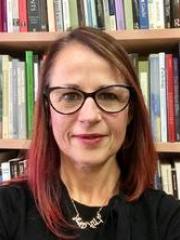
Researcher biography
As an Australian Research Council Future Fellow and Associate Professor of Cultural Studies in the Institute for Advanced Studies in the Humanities at the University of Queensland, Elizabeth Stephens’ research explores collaboration between the arts and sciences, on a broad level. More recently, Stephens has investigated this through the prism of artificial intelligence and automation, alongside art, labour, and gender studies, with practices such as public exhibitions of the body and work. Her Future Fellowship examines practices of experimentation as a site of collaboration between the arts and sciences, from the nineteenth-century scientific laboratory to contemporary experimental art. “While it may appear we are currently witnessing a radical increase or reconfiguration of the emotions under the conditions of late modernity, in fact the technological mediation of the emotions is not a recent occurrence but rather part of a longer history in which affect and automation have become entwined,” Stephens says in the 2019 book chapter Affect and automation: A critical genealogy of the emotions.
Stephens appeared on the 2018 episode of the Flash Forward podcast titled Portrait Of The Artists As An Algorithm, looking at the Museum of Non-Human Art, “a brand new gallery full of art made entirely by machines, computers, algorithms, robots and other non-human entities.”
According to Stephens, the history of automation and art has been intertwined for centuries, dating back to the origin of the term ‘robot’, which was derived from the context of theatre.
“Automata designed to make music or to draw, like the examples of contemporary robotic art discussed below and elsewhere in this book, enable forms of debate and exploration not available in other cultural domains. While there may be a cultural tendency to assume that automation (or robots) and affect (or art) are opposed, then, their history is precisely that of the “unlikely symbiosis” examined in this book. We might understand this space of intersection as the expression of a sort of machinic imaginary, in which the relationship between automated movement and agency, or art, is a mutually constitutive one.” - We Have Always Been Robots: The History of Robots and Art (Stephens and Heffernan, 2016)
In May 2020, Stephens appeared as part of a conversation hosted by UQ Art Museum, that considered the social, cultural and public health impacts of pandemics on human society, and how emerging norms could be understood.
Until 2024, Stephens will continue this inquiry through the ARC Discovery Project 'The Cultural and Intellectual History of Automated Labour', with CIs Sarah Collins, Ionat Zurr, and Oron Catts (UWA). The project will trace how debates about labour automation have been shaped by cultural depictions of work, from the eighteenth century to today, producing new knowledge about how people have viewed industrial transformation, from the steam engine to modern forms of labour saving - electronic, digital, biological, and artificial intelligence. In order to do this, the project will combine historical study with an examination of the way artists and writers have responded to labour automation, with a view to informing public debate about the future of work, and shaping policy in arts-science museums and laboratories.
